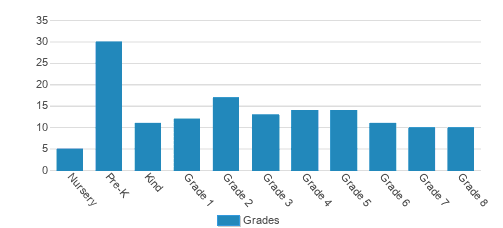St. Augustine serves 147 students in grades Kindergarten-9. The student:teacher of St.
Augustine is 12:1 and the school's religious affiliation is Catholic.
School Overview
Religious Affiliation
Grades Offered
Grades Kindergarten-9
Student Body
Total Students
147 students
Student Body Type
Co-ed
% Students of Color
19%
State avg.: 40%
Students by Grade

Academics and Faculty
Total Classroom Teachers
12 teachers
Student : Teacher Ratio
12:1
National avg.: 13:1
Average Class Size
10 students
Classroom Dress Code
Formal
Uniform
Tuition and Acceptance Rate
Admission Deadline
None / Rolling
Tuition Notes
Please call school for details
Acceptance Rate
100%
National avg.: 85%
Source: National Center for Education Statistics (NCES)
Frequently Asked Questions
What is the acceptance rate of St. Augustine?
The acceptance rate of St. Augustine is 100%, which is higher than the national average of 78%.
When is the application deadline for St. Augustine?
The application deadline for St. Augustine is rolling (applications are reviewed as they are received year-round).
Recent Articles

A Parent's Guide To Understanding High School Teaching Methods
This comprehensive guide helps parents navigate the various teaching methods used in today's high school classrooms. By understanding these approaches, you'll be better equipped to support your teen's learning journey, communicate effectively with teachers, and create a complementary learning environment at home.

February 08, 2025
Social Emotional Learning: Education's Hidden SymphonyA musician's perspective on Social Emotional Learning reveals how this educational framework orchestrates success through five essential emotional competencies.

January 24, 2025
A Roadmap For Starting A Private SchoolUse this roadmap as a set of talking points with your trusted mentors and professionals to start the private school of your dreams. You're not alone. Over the years, hundreds of folks like you have had the same dream. From Quintilian to Maria Montessori to Lucy Madeira Wing, visionary educators have established schools to teach according to their beliefs and methodologies.















